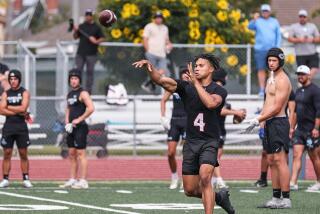North Texas Figures To Take Home Most Money This Season
DENTON, Texas — The University of North Texas three years ago struggled to find players to field a Division I-A football team.
This year, the school will win what some athletic officials see as one of college football’s most prestigious honors.
North Texas will earn about $1.28 million in 1998 from a road schedule that includes games at Oklahoma, Arizona State, Texas A&M; and Kansas--the most money believed to be collected this season by a school willing to trade lopsided losses for six-figure paydays.
“At least we know we’re going to win something this year,” said North Texas Associate Athletic Director Allen Ward. “It’s not the Heisman, but we’ll take it.”
North Texas is one of at least eight Division I-A schools this year that’s playing “buy games,” where weak football programs accept as much as $500,000 from football powers to play them on the road. The weak team gets a payday big enough to help a struggling athletic department, and the football power usually gets an easy home win in front of a sell-out crowd.
As these smaller programs gain notoriety for schedules befitting national championship contenders, some athletic directors are suggesting that the team that earns the most from its buy games get an award:
“A trophy with a guy getting kicked in the seat of the pants,” said Steve Sloan, Central Florida’s athletic director. “One guy bending over with another one kicking him.”
Arkansas State Athletic Director Barry Dowd had another suggestion: “I’d give a giant golden screw sitting on a pedestal.”
Such a prize will come a year too late for Central Florida. The school raised an NCAA-record $1.4 million from a five-game road schedule last season that included powerhouses Nebraska and Auburn.
Sloan didn’t want his team too demoralized from lopsided losses, so he’s given the school a breather this year. He’s scheduled only two tough away contests, Purdue and Auburn, on a slate that’ll earn the school $700,000, half of what it made in 1997.
Central Florida could be back on top next year. The school will play at Florida, Georgia, Georgia Tech and Auburn, a schedule Sloan said will earn the Orlando, Florida-based university at least $1 million.
“At least I can say we’ve won a national championship for guaranteed money,” Sloan said. “There aren’t too many people with one of those titles, let alone two.”
The University of Alabama-Birmingham just missed winning the guaranteed money national championship this season. The school will earn $1.15 million from a schedule that includes games at Nebraska, Tennessee and East Carolina.
Arkansas State is taking a cost-conscious approach to buy games. Instead of flying to Lincoln, Nebraska, or Ann Arbor, Michigan, for potential $500,000 payouts, Arkansas State’s Dowd is busing his squad to Memphis State and the University of Mississippi. That’ll allow Arkansas State to pocket most of the $100,000 from Memphis State and $250,000 from the University of Mississippi.
“Most of that money is pure profit,” Dowd said. “You still have to feed the team, but they can only eat so much.”
Football powers, which usually sell out their home games, also benefit from these arrangements. Alabama will see a profit of about $1.75 million for each home game this year, a figure that doesn’t change much because of the opponent, said Steve Townsend, Alabama’s senior associate athletic director for sports programs.
Of course, playing an unknown school doesn’t come without risk. The Crimson Tide paid Louisiana Tech $350,000 last season for what was supposed to be an easy homecoming victory. Louisiana Tech, a three-touchdown underdog, stunned the crowd of about 70,000 with a 26-20 upset. Alabama isn’t playing a buy game this year.
And in one of the most exciting games last season, Central Florida, a 43-point underdog to Nebraska, trailed by only a touchdown midway through the fourth quarter before losing 38-24. That performance, coupled with near victories at the University of Mississippi and South Carolina, earned Central Florida its first-ever vote in the Associated Press top-25 poll.
These lesser-known schools aren’t always mercenaries. The University of the Tennessee called this spring to offer Northeast Louisiana between $400,000 and $500,000 to play at Knoxville, Tennessee. The Monroe, Louisiana-based school turned down the proposal.
Since Northeast Louisiana already is traveling to Florida, Kansas State and Arizona, the athletic department didn’t want to risk another rout.
“There comes a point where it doesn’t make sense to do that,” said Northeast Louisiana’s Athletic Director, Richard Giannini. “ . . . Some of those who will pay a half a million will do a half million worth of damage to your football team.”
Northeast Louisiana and other smaller schools could see their paydays for buy games declining. The NCAA has passed legislation that allows teams to count one victory against a Division I-AA opponent every four years toward the six-victory Division I-A minimum required for a bowl bid.
Opening up buy games to Division I-AA squads--one level below the top college football teams--will increase the pool of willing takers from about eight schools to more than 100.
Even if the buy games’ earnings decline in 1999, it shouldn’t stop the clamor for a possible “kicked-in-the-seat-of-the-pants,” award, Giannini said.
“We need something for us guys at the bottom end,” Giannini said. “At least this is something.”
More to Read
Go beyond the scoreboard
Get the latest on L.A.'s teams in the daily Sports Report newsletter.
You may occasionally receive promotional content from the Los Angeles Times.










